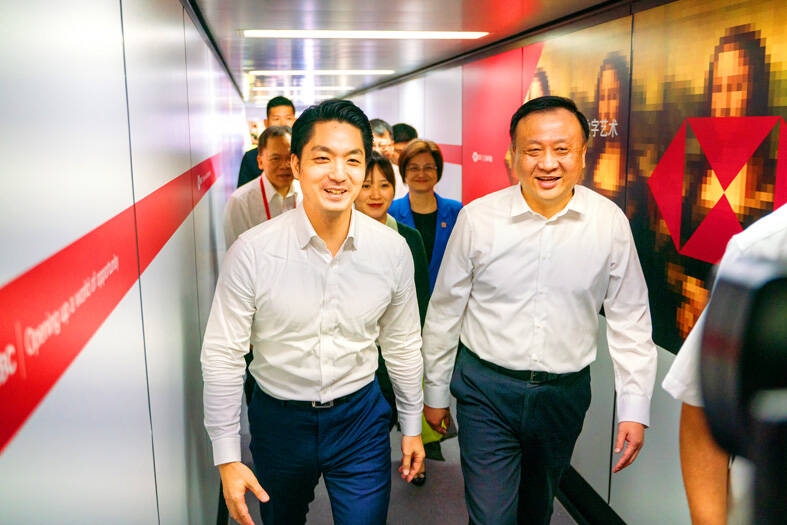A delegation led by Taipei Mayor Chiang Wan-an (蔣萬安) set off on a three-day visit to Shanghai yesterday morning to attend the annual Shanghai-Taipei Twin-City Forum, with Chiang saying that he would use the opportunity to facilitate the prosperous development of the capital and the nation.
“The Republic of China is a democratic country, so there will be contrasting opinions toward any important policy decision ... so we are very grateful and will value it,” Chiang told reporters before boarding a plane at Taipei International Airport (Songshan airport) yesterday morning.
Taiwan Republic Office director Chilly Chen (陳峻涵) was at the airport holding a sign that read: “The twin-city forum is the model for the ‘united front’ campaign,” and urged Chiang not to become a “chess piece” in China’s “united front” tactics toward Taiwan.

Photo courtesy of the Taipei City Government
Chen said that Chiang should not waste taxpayers’ money by attending the forum and instead focus on municipal administration.
Due to the Chinese Communist Party (CCP) intensifying its rhetoric and military coercion, Chiang, as mayor of Taipei, should use the forum as a platform to speak up for Taiwanese and protest against the CCP, Democratic Progressive Party (DPP) Taipei City Councilor Chien Hsu-pei (簡舒培) said.
Chiang should ask the CCP to stop its malicious behavior toward Taiwan and express mutual friendliness, and if the CCP is unwilling to respond to his request, he should carefully consider whether Taipei should host the next annual forum, she said.
“Taipei is the most developed area in Taiwan, and as Taipei mayor I have a responsibility to grasp any opportunity to strive for the prosperous development of the city and the nation,” Chiang said, adding that no matter changes in party politics or cross-strait relations, the forum has served to maintain dialogue between the cities of Taipei and Shanghai.
He said that cross-strait relations are fraught, which is not something Taiwanese want to see, but steady trade and economic exchanges continue through the Economic Cooperation Framework Agreement, and while there is friction between the two sides on exports of agricultural and fisheries products, it needs to be solved through talks.
“Cross-strait relations are complicated and cannot be simplified to a few sentences, so there must be a mechanism for dialogue,” Chiang said, adding that action is needed resolve friction.
He said people should feel safe and assured that “our intention to value democracy, and maintain peace and prosperity remains consistent.”
Upon arriving at the airport in Shanghai at about 10am, Chiang and the delegation were greeted by Shanghai Vice Mayor Hua Yuan (華源).
Additional reporting by Chen Yu-fu

CHAOS: Iranians took to the streets playing celebratory music after reports of Khamenei’s death on Saturday, while mourners also gathered in Tehran yesterday Iranian Supreme Leader Ayatollah Ali Khamenei was killed in a major attack on Iran launched by Israel and the US, throwing the future of the Islamic republic into doubt and raising the risk of regional instability. Iranian state television and the state-run IRNA news agency announced the 86-year-old’s death early yesterday. US President Donald Trump said it gave Iranians their “greatest chance” to “take back” their country. The announcements came after a joint US and Israeli aerial bombardment that targeted Iranian military and governmental sites. Trump said the “heavy and pinpoint bombing” would continue through the week or as long

TRUST: The KMT said it respected the US’ timing and considerations, and hoped it would continue to honor its commitments to helping Taiwan bolster its defenses and deterrence US President Donald Trump is delaying a multibillion-dollar arms sale to Taiwan to ensure his visit to Beijing is successful, a New York Times report said. The weapons sales package has stalled in the US Department of State, the report said, citing US officials it did not identify. The White House has told agencies not to push forward ahead of Trump’s meeting with Chinese President Xi Jinping (習近平), it said. The two last month held a phone call to discuss trade and geopolitical flashpoints ahead of the summit. Xi raised the Taiwan issue and urged the US to handle arms sales to

BIG SPENDERS: Foreign investors bought the most Taiwan equities since 2005, signaling confidence that an AI boom would continue to benefit chipmakers Taiwan Semiconductor Manufacturing Co’s (TSMC, 台積電) market capitalization swelled to US$2 trillion for the first time following a 4.25 percent rally in its American depositary receipts (ADR) overnight, putting the world’s biggest contract chipmaker sixth on the list of the world’s biggest companies by market capitalization, just behind Amazon.com Inc. The site CompaniesMarketcap.com ranked TSMC ahead of Saudi Aramco and Meta Platforms Inc. The Taiwanese company’s ADRs on Tuesday surged to US$385.75 on the New York Stock Exchange, as strong demand for artificial intelligence (AI) applications led to chip supply constraints and boost revenue growth to record-breaking levels. Each TSMC ADR represents

Pro-democracy media tycoon Jimmy Lai’s (黎智英) fraud conviction and prison sentence were yesterday overturned by a Hong Kong court, in a surprise legal decision that comes soon after Lai was jailed for 20 years on a separate national security charge. Judges Jeremy Poon (潘兆初), Anthea Pang (彭寶琴) and Derek Pang (彭偉昌) said in the judgement that they allowed the appeal from Lai, and another defendant in the case, to proceed, as a lower court judge had “erred.” “The Court of Appeal gave them leave to appeal against their conviction, allowed their appeals, quashed the convictions and set aside the sentences,” the judges